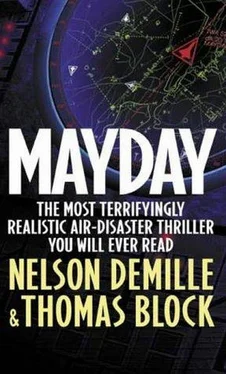Nelson DeMille - Mayday
Здесь есть возможность читать онлайн «Nelson DeMille - Mayday» весь текст электронной книги совершенно бесплатно (целиком полную версию без сокращений). В некоторых случаях можно слушать аудио, скачать через торрент в формате fb2 и присутствует краткое содержание. Жанр: Триллер, на английском языке. Описание произведения, (предисловие) а так же отзывы посетителей доступны на портале библиотеки ЛибКат.
- Название:Mayday
- Автор:
- Жанр:
- Год:неизвестен
- ISBN:нет данных
- Рейтинг книги:4 / 5. Голосов: 1
-
Избранное:Добавить в избранное
- Отзывы:
-
Ваша оценка:
- 80
- 1
- 2
- 3
- 4
- 5
Mayday: краткое содержание, описание и аннотация
Предлагаем к чтению аннотацию, описание, краткое содержание или предисловие (зависит от того, что написал сам автор книги «Mayday»). Если вы не нашли необходимую информацию о книге — напишите в комментариях, мы постараемся отыскать её.
Mayday — читать онлайн бесплатно полную книгу (весь текст) целиком
Ниже представлен текст книги, разбитый по страницам. Система сохранения места последней прочитанной страницы, позволяет с удобством читать онлайн бесплатно книгу «Mayday», без необходимости каждый раз заново искать на чём Вы остановились. Поставьте закладку, и сможете в любой момент перейти на страницу, на которой закончили чтение.
Интервал:
Закладка:
“Okay,” Sloan answered, “that’s good. Our readout still shows the target as level at sixty-two thousand. The target’s transmitting equipment must have been damaged by the impact. Maybe the Phoenix just grazed the drone.” With no warhead, Sloan knew that complete destruction would require a full-face hit. “Continue to track, and we’ll consider our shipboard monitors as dysfunctional.”
“Roger.” But something else bothered Matos. The target was not falling very rapidly. His own jet could dive faster than the target was going down. For what should have been a smashed target drone tumbling through the sky, it was not performing as expected.
Data is missing, he thought. The only reason it made no sense was that he was operating without all the information. Garbage in, garbage out, as they said in the computer classes at Pensacola. Don’t jump to wild conclusions. Leave the emotional responses to civilians. Military technicians waited for the data. Technology was really the science of hindsight. When they corrected and analyzed all the material, they would easily discover what had made this test seem so bizarre.
Matos was no longer apprehensive. There was something about rote procedures that was calming and comforting. As long as he stuck to the technician’s routines, then he could push his fears away. The blips on his radar had again become no more than game pieces, and the entire maneuver had taken on the aura of electronic chess.
The impact has distorted the drone’s shape, Matos thought. It’s been bent into some sort of low-drag lifting body. Flattened out into a metal parachute that has already reached its terminal velocity. Wilder things have happened. Matos felt that Commander Sloan’s idea that the test missile had only nicked the target drone was probably right. That would explain how and why the drone’s misleading signals were still being routinely sent to the Nimitz.
“Vertical scan indicates twenty-five thousand,” Matos reported. Events had settled down, and things were beginning to make sense. “Seventeen thousand feet. The target is now tracking thirty-eight degrees to the right of its intercepted course. I am showing…”
As Matos’s eyes traveled over the array of data readouts, he froze when he saw the new trend. It was too far from normal to pretend otherwise. “Homeplate… the target’s descent rate has decreased.” Matos’s voice was pitched higher. “Eight thousand a minute. Now it’s six thousand a minute. The altitude is fourteen thousand feet. The descent rate has dropped to three thousand a minute. The target is leveling out at eleven thousand feet!”
After just a few minutes’ pause, Sloan’s voice filled the void. “Navy three-four-seven, I don’t know what the hell has happened out there, but you better find out. Fast.” There was no longer any mistake about the timbre of Sloan’s voice or its intent.
“Roger, Homeplate. Proceeding toward the target. I’ll obtain a visual sighting.” Matos pushed the throttles forward. The F-18 accelerated rapidly, pushing him back against his seat. A flood of disjointed emotions swelled in him, but he held them at bay. He directed all his energies at the technical task of intercepting the moving radar target.
“That’s a good question, Commander. What the hell has happened out there?” Randolf Hennings had begun to allow himself a small measure of an admiral’s anger. He had played silent errand boy far too long. Retired or not, Hennings’s natural propensity for leadership-in mothballs for the past several years, like his naval uniforms-had begun to emerge. Sloan was losing control of the situation.
Hennings had not liked Commander James Sloan from their first handshake. There was something too shrewd and calculated about the man. He had shown no hint of good nature. It was as if the universe had been created solely for the benefit of Commander Sloan.
Sloan had ignored the Admiral’s question. “We’ll take over,” he said to Petty Officer Loomis. He dismissed the technician, and Loomis left the room quickly and quietly. “Nothing wrong has happened, I’m sure,” Sloan finally answered, turning toward Hennings. “But even if something has… there’s no need to let it get beyond the two of us. I won’t call the electronics specialist back until we’ve resolved whatever the problem is.”
“There are three of us,” Hennings said. “Don’t forget your pilot. He knows more than we do. He’s the one who’s out there. We don’t get a very clear picture…” He motioned toward the stack of electronics. “… from all of this.”
“Matos is no problem,” Sloan answered. “I know how to pick men. I know how to assign jobs.”
Randolf Hennings looked with marked disdain at the young commander. He doesn’t command men. He uses them, Hennings thought. Men like him were no good for a crew, a ship, or a navy. “Don’t be surprised if your subordinates sometimes take a tack against the prevailing wind.”
“ Surprised? Hell, no. I’d be amazed.” But as soon as he said it, Sloan knew he had gone too far. He had let the remark out too quickly, on the heels of all the wrong turns that events had taken. The remark hung in the air between the two men, and Sloan regretted it. An unnecessary indulgence.
Sloan tried to eradicate his error. He smiled at Hennings, then forced a small laugh. “You’re right, Admiral. They sometimes try to tack against the wind. We all do, on occasion.”
Hennings nodded slightly but said nothing. He resented being linked to Sloan, no matter how minor the inference. If this were the old days back on the John Hood, he would have called this officer to his quarters and, in private, reamed him out. Remember the mission, Hennings thought, quoting to himself what a lifetime of experience had taught him.
“We’re trying to do a job, not win points,” Hennings said. The retired Admiral had built his naval career on precisely that premise. Embarrassing your subordinates was, he felt, counterproductive. You would get a man’s best only when he cared enough to produce. Threats would get you no more.
Sloan grunted an unintelligible reply, then turned his eyes toward the electronics console. He basically understood how to work the equipment, and he checked it over to refresh his memory. Sloan moved quickly and competently around the gangs of switches and dials, like a skilled surgeon performing a familiar operation.
Hennings watched him for a few moments, then sighed. Perhaps he had been too critical. Perhaps he was getting too old. Times had changed. It was Sloan’s show. Undermining the Commander’s confidence or taking exception with his methods would do no one any good, least of all the Navy. No one should try to be the captain of every ship.
“Just a few more minutes, Admiral.” Sloan was aware of Hennings’s displeasure. It was another factor to be considered. The successful completion of the mission was the first concern, but not alienating the retired Admiral was an important second. He had gotten off to a bad start with the old man, and would need to do some work to get things even-keeled. A successful test firing would make it easy to bridge the gap. Nothing made people friendlier than a shared success.
Hennings sat down on the edge of the console. He gazed blankly across the room at the closed hatchway door.
Sloan found himself tapping his fingers against the glass face of the panel-mounted clock. He shifted positions. Then he coughed lightly to clear his throat. If things went well, it could all be wrapped up within the hour. “Not much longer,” he said to break the silence. “Matos should be just about in visual range of our target.”
Matos’s first sight of the target was routine enough: a black dot that hung motionless against the blue sky. Without anything nearby to provide perspective, size was an indeterminate thing.
Читать дальшеИнтервал:
Закладка:
Похожие книги на «Mayday»
Представляем Вашему вниманию похожие книги на «Mayday» списком для выбора. Мы отобрали схожую по названию и смыслу литературу в надежде предоставить читателям больше вариантов отыскать новые, интересные, ещё непрочитанные произведения.
Обсуждение, отзывы о книге «Mayday» и просто собственные мнения читателей. Оставьте ваши комментарии, напишите, что Вы думаете о произведении, его смысле или главных героях. Укажите что конкретно понравилось, а что нет, и почему Вы так считаете.












